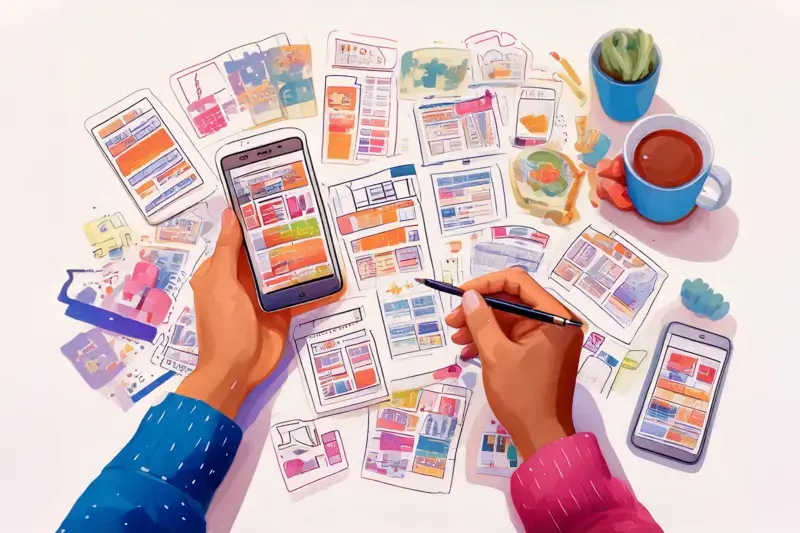Can I Build a Mobile App Myself?
If you're a business and have ever considered building a mobile app, one of the first questions you might ask yourself is "Can I build a mobile app myself?" It's a good question, especially with the increasing number of online tools and resources promising to make DIY app development a breeze. But, is it really that simple?
It always seems impossible until it’s done.Nelson Mandela
Here at Glance, we understand that you're juggling multiple hats – from managing day-to-day operations to setting long-term strategies so tackling a new mobile app project whilst exciting, might be somewhat overwhelming! Getting it right is about more than just slapping together some code and launching it on the app store. So, let's answer this question together and see if building a mobile app yourself is a path worth exploring, or if it might be better left to the experts.
By the end of this guide, you'll have the knowledge to decide whether building a mobile app yourself is the right move for your business and if not, what your options might be.
Stick with us, and by the end of this guide, you’ll not only understand the ins and outs of mobile app development but also be confident in your next steps. Ready to get started? Let's get to it!
Why You Might Consider Building Your Own Mobile App
We get it; the idea of building your own mobile app sounds both exciting and daunting. As a business owner, you're constantly on the lookout for ways to innovate and stay ahead so you might be thinking, "Hey, we're a clever bunch. How hard can it be?" In some cases, rolling up your sleeves and diving into mobile app development can indeed be a valuable experience. Let’s break down why you might consider taking on this challenge yourself.
Cost Savings: Developing an app in-house can often save you a significant amount of money, as long as you already have some tech-savvy team members. Instead of spending a chunk of your budget on outsourcing, you might be able to use existing resources more efficiently.
Full Control: Creating an app yourself gives you total control over every aspect of its development. From the tiniest design details to the overall user experience, you can ensure that the app aligns perfectly with your vision and business goals.
Faster Iterations: When you’re in charge, you can iterate quickly, making changes and improvements on the fly without waiting for a third party. This agility can be crucial, especially if you're trying to get your app to market before your competitors.
But, let's be real for a moment: while these factors can be very appealing, building an app from scratch isn't a walk in the park. It requires a mix of technical skills, time, and the right mindset. There will be hurdles, and at some point, the frustration might make you want to throw your keyboard out the window. But that's where we come in to help ease those growing pains and guide you through the process, whether you decide to go it alone or bring in some seasoned professionals.
What Does It Take To Build A Mobile App?
Great, now let's dig in a bit! Building a mobile app might seem like a daunting task at first, but breaking it down into manageable parts will help so here are the crucial steps you need to grasp:
1. Defining Your App’s Purpose
First things first, what problem is your app solving? Whether it's enhancing customer engagement or streamlining business operations, having a clear objective is vital. Think of it as the foundation of your app's success. You don't want to build a castle on shaky ground, do you?
2. Market Research
Before you dive headfirst into development, it's essential to understand your market. What are your competitors doing? What gaps can your app fill? This information will guide your app’s unique features and help it stand out. Consider setting aside some time to analyse similar apps and gather user feedback.
3. Features and Functionality
Once you’ve got a grip on the market, it’s time to list down the features your app will offer. This can range from basic functionalities like user login to more advanced features like integration with third-party services. Be mindful of not overstuffing your app—sometimes, less is more!
4. Technical Requirements
Alright, here comes the techie stuff. You'll need to decide on the platform (iOS, Android, or both), choose the programming languages, and identify the necessary software development kits (SDKs). For instance, Swift for iOS and Kotlin for Android are popular choices. Don't worry if you're not tech-savvy; there are plenty of resources and communities that can help you out.
5. Design
This is where creativity meets functionality. Your app's design plays a huge role in user experience. A good design is intuitive and user-friendly. Tools like Sketch and Adobe XD can be very helpful in creating mockups and prototypes. Plus, it’s quite fun to see your vision start coming to life!
6. Development
Now, onto the meat and potatoes: coding. This phase involves turning those design mockups into a functional app. It’s where your technical groundwork pays off. You can either learn to code or use a development platform to ease the process. It’s a bit like choosing between cooking a meal from scratch or using a meal kit—both have their pros and cons.
7. Testing
Once your app is developed, it’s time for a thorough evaluation. Testing ensures that everything functions as intended and helps catch bugs before your users do. Use various tools and perhaps even get some beta testers to provide feedback. It's much better to fix issues now rather than after the app has launched.
8. Deployment
Your app is all set and now ready to meet the world! To launch it, you’ll need to adhere to platform-specific guidelines for app stores. Be prepared for an approval process which might take some time. Remember, patience is a virtue.
9. Maintenance and Updates
The journey doesn’t end with the launch. Regular updates and maintenance are crucial for keeping your users happy and your app functional. Think of it as ongoing customer service; you wouldn’t want to leave your users in the lurch, would you?
So, there you have it, a snapshot of what it takes to build a mobile app. Yes, it's detailed and might feel overwhelming, but remember, every big accomplishment starts with a single step. And if at any point you feel stuck, it's perfectly okay to ask for help. After all, that's what we're here for!
Tools And Resources
When it comes to building your own mobile app, there are some fantastic tools and resources available that can make the process much easier. Let’s break down a few essentials:
App Builders and DIY Platforms
If you're not a coding wizard, don’t worry—app builders like Appy Pie, BuildFire, and GoodBarber can be lifesavers. These platforms provide you with drag-and-drop interfaces, pre-built templates, and a lot of customisation options. Think of them as the Swiss Army knives of app building.
Programming Languages and Frameworks
If you’re feeling a bit more adventurous and want to dive into the code, you'll need to get familiar with programming languages like Java and Kotlin for Android, or Swift for iOS. Frameworks like React Native and Flutter allow you to create cross-platform apps, which means you can write the code once and deploy it on both Android and iOS. Nifty, right?
Development Environments
Tools like Android Studio and Xcode are your go-to platforms for Android and iOS development, respectively. These integrated development environments (IDEs) come packed with features that help you write, test, and debug your code.
Design Tools
Don’t overlook the importance of design. Software like Sketch, Figma, and Adobe XD are perfect for creating wireframes and prototypes. You don’t have to be Picasso to understand the value of a user-friendly design!
Learning Resources
You don’t need a Computer Science degree to start building an app. Platforms like Udemy, Coursera, and even YouTube offer fantastic tutorials and courses. Want to learn Swift over the weekend? You’ve got it!
Getting started with these tools doesn’t just save you some dosh but also empowers you with invaluable skills. However, do keep in mind the learning curve and time investment. Building an app isn’t a weekend project, it can be more like moving a mountain with a teaspoon if you're not experienced. But if you're up for the challenge, these tools will be your best mates.
Common Challenges Business Owners Face When Building Their Own App
Building a mobile app sounds like an exciting venture, doesn’t it? But the reality is that diving headfirst into mobile app development isn’t always smooth sailing. Here are some hurdles you might encounter:
Technical Expertise
Let’s be straight: building an app isn't like throwing together a quick PowerPoint presentation. Performance issues, bugs, and technical hiccups can pop up at any time. And if you aren’t equipped with a solid understanding of it all, things can get really challenging, really fast.
Time Constraints
You're already juggling multiple aspects of running a business. Adding app development to your plate means something else might take a back seat. Many business owners underestimate the amount of time required to build, test, and deploy an app.
Quality Assurance
A poor user experience can be the kiss of death for your app. Ensuring your app runs smoothly across different devices and operating systems is no small feat. You’ll need thorough testing, which can be time-consuming and requires specific know-how.
Budget Management
Sure, doing it yourself might seem cost-effective initially. However, hidden costs like software licenses, development tools, and potential rework can quickly add up. Not to mention, time is money. The longer you spend on development, the less time you have to focus on your core business.
Security Concerns
We’ve all read the horror stories about apps being hacked. Securing your app to protect sensitive user data involves a comprehensive understanding of potential vulnerabilities and how to patch them—something often overlooked by novices.
Consistency and Updates
Building the app is just the beginning. Keeping it updated with the latest features, security patches, and operating system changes is a continuous process. This ongoing commitment requires time and technical resources.
These challenges are not insurmountable, but they are significant. It’s important to weigh these factors carefully before deciding to go solo on your app development journey. Remember, knowing when to ask for help is a strength, not a weakness!
Is DIY The Best Choice?
Here's a reality check: We all love a good bargain, and the idea of saving money by building your own mobile app can be incredibly tempting. But let's think about what you're actually getting into. Balancing quality and cost isn't just about the upfront money you'll save—it's about the long-term value your app will deliver to your business.
Consider the time involved. Building a mobile app is not a one-weekend DIY project. It requires a significant time investment that could stretch over weeks or even months. During this period, your attention will be divided, potentially affecting other critical aspects of your business. Could this time be better spent elsewhere, perhaps focusing on strategy, customer relations, or boosting your sales?
Then there's the skillset required. Building an app from scratch isn't just about stringing some code together. It involves a mix of coding, design, user experience, and continuous testing. If you or your team lack experience in any of these areas, you're looking at a steep learning curve with plenty of room for costly mistakes.
| Skill | Importance | Potential Challenges |
|---|---|---|
| Coding | High | Requires knowledge of programming languages and frameworks; Errors can lead to functionality issues |
| Design | Medium | Creating a visually appealing and intuitive UI; Lack of design skills can result in a poor user experience |
| User Experience (UX) | High | Understanding user needs and behaviours; Poor UX can lead to app abandonment |
| Testing | High | Identifying and fixing bugs; Inadequate testing can result in a flawed app release |
| Maintenance | Ongoing | Regular updates and bug fixes; Neglect can cause security vulnerabilities and performance issues |
Let's talk about quality. A half-baked app can do more harm than good. Imagine launching an app that crashes constantly or doesn't perform as users expect. This can tarnish your brand and result in lost customers. Professionals in this field spend years honing their skills to avoid such pitfalls.
And what about those hidden costs? While you might save on initial development costs, you could end up spending more down the line on fixes, updates, and user support. These are expenses that are often underestimated but inevitable.
It's essential to weigh these factors carefully. Sometimes hiring a professional can be more cost-effective in the long run. When you partner with experts, you're not just buying a product; you're investing in peace of mind, knowing your app will be of high quality and delivered on time.
At the end of the day, the decision is yours. But keep in mind that quality and cost are not mutually exclusive—they go hand in hand. Skimping on quality to save a few pounds today might cost you more tomorrow.
When To Seek Professional Help
Navigating the world of mobile app development is a bit like trying to navigate through a dense forest without a map. Sure, you might find your way eventually, but you’ll probably face a few bumps and bruises along the way. Here's where knowing your limits can actually save you a ton of time, money, and stress.
One of the key moments to seek professional help is when your app’s requirements get complex. Imagine having to integrate payment systems, secure user data, or implement chat functionalities. These tasks need expert handling to ensure they’re done correctly and securely. It's a lot to manage without specialised skills and experience.
Another red flag? When time is not on your side. Developing an app is not just a weekend project. It requires careful planning, execution, and continuous improvement. If your business has a tight deadline or if this app is essential to your company's operations, professional developers can deliver a polished product more efficiently. They'll handle the heavy lifting, so you can focus on your core business activities.
It's not about ideas. It's about making ideas happen.Scott Belsky
You should also consider bringing in the pros when the stakes are high. If your app is expected to serve a large user base or handle sensitive information, the risks associated with DIY development just aren’t worth it. Remember those data breaches you keep reading about? Proper security measures implemented by experts can prevent your app from becoming the next horror story.
Last but not least, there's a matter of quality. A beautifully designed, user-friendly app can significantly enhance your brand’s credibility. In contrast, a poorly executed one can do quite the opposite. Professional app developers and designers bring both skill and aesthetic sense to the table, ensuring your app is not only functional but also visually appealing.
So, next time you’re pondering “Should I do this myself?”, weigh these considerations carefully. Bringing in professional help might be just what you need to navigate through the complexity and come out the other side successful and unscathed.
Conclusion
Building a mobile app yourself is undeniably a thrilling prospect. It offers a chance to bring your unique vision to life and potentially save on development costs. However, the journey is laden with challenges, from technical intricacies to time constraints and everything in between.
If your business decides to take on this venture, arming yourself with the right tools, learning resources, and a willingness to tackle unforeseen hurdles is crucial. Yet, it's equally important to recognise when the project demands expertise beyond your current capabilities. The balance between cost-saving through DIY efforts and ensuring a high-quality, functional app can be delicate.
At Glance, we understand the allure of the DIY route—after all, who wouldn’t want to take full control of their project? But we also know the ins and outs of bringing an app idea to life with the precision that comes from years of experience. Whether you choose to go it alone or seek professional help, our goal is to ensure you have all the information and support you need to make the best decision for your business.
Remember, the end game is not just to build an app but to create a tool that truly serves your business and your customers. So, whether you're laying the first brick yourself or calling in the experts, keep your eye on the prize: a seamless, user-friendly app that stands out in a crowded digital marketplace.
Happy building!
Share this
Subscribe To Our Learning Centre
You May Also Like
These Related Guides

How Long Does It Really Take to Build a Mobile App?

How Do I Create a Mobile App Privacy Policy?



